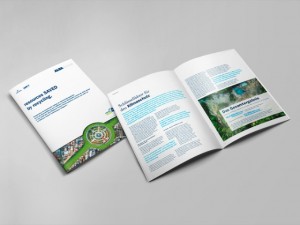
The “resources SAVED by recycling” study presented today, which the Fraunhofer Institute UMSICHT prepared on behalf of the ALBA Group, proves that the ALBA Group, one of the worldwide leading recycling and environmental services companies, makes a direct contribution to climate protection through recycled raw materials. In 2019, the ALBA Group saved more than 4.2 million tonnes of climate-damaging greenhouse gases through the closed-loop circulation of 6 million tonnes of recyclables. This corresponds to the positive annual impact on the climate of about 59 million trees. At the same time, recycling saved 32.3 million tonnes of resources, such as crude oil, bauxite and iron ore compared to primary production.
“Recycling leads to far fewer greenhouse gas emissions than the use of primary raw materials,” explains Dr. Axel Schweitzer, CEO of the ALBA Group. “The use of our quality-tested recycled plastics, for example, reduces emissions of greenhouse gases by more than 50 percent in comparison with the production of plastics from crude oil. There is no better argument for the increased use of recyclates.”
The Fraunhofer Institute for Environmental, Safety and Energy Technology UMSICHT has been researching how the recycling activities of the ALBA Group have been affecting the climate and natural resources for 13 years. Its results are published annually in the “resources SAVED by recycling” brochure. The material flows for plastics, metals, waste electrical and electronic equipment, wood, paper/board/cardboard and glass were included in the study in 2019. Our team of experts has many years of experience in the ecological evaluation of products and services. The focus is on the chemical, plastics and green IT industries, as well as on recycling management.
Close collaboration of all manufacturers along the value chain increases savings potential
“Our life-cycle analysis demonstrates the currently excellent potential of recycling for climate protection right down to the kilogram,” explains Dr.-Ing. Markus Hiebel, Head of the Sustainability and Participation Department at the Fraunhofer Institute UMSICHT.
“The better the individual stakeholders in the value chain of products and packaging collaborate, the greater the potential for possible savings.” The scientist perceives there to be an increasing willingness on the part of all those involved to take responsibility and to work closer together. Many manufacturers are now committed to using recycled raw materials in their products. “All in all, further incentives should be created to increase the use of recyclates. If the share of recyclates becomes a purchasing criterion in the procurement, this will significantly increase demand,” explains Hiebel.
The full results of the study are available at the information portal www.resources-saved.com.
Source
Fraunhofer UMSICHT, press release, 2020-10-08.
Supplier
ALBA AG
Fraunhofer-Institut für Umwelt-, Sicherheits- und Energietechnik (UMSICHT)
Share
Renewable Carbon News – Daily Newsletter
Subscribe to our daily email newsletter – the world's leading newsletter on renewable materials and chemicals










